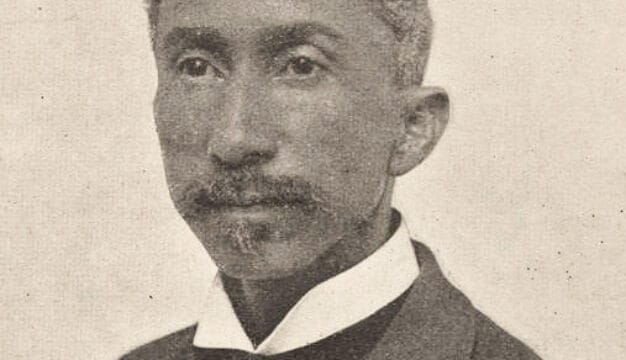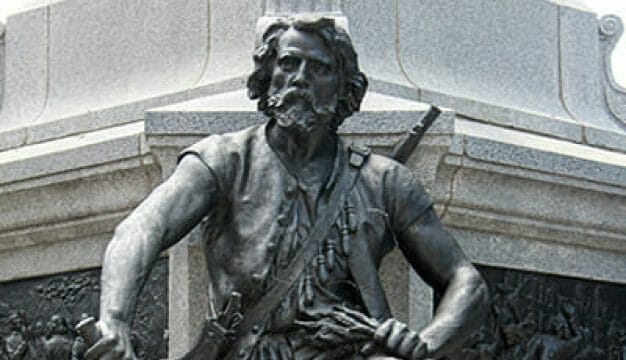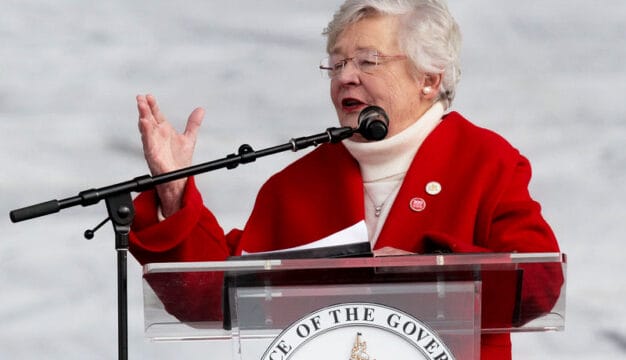John J. Sparkman
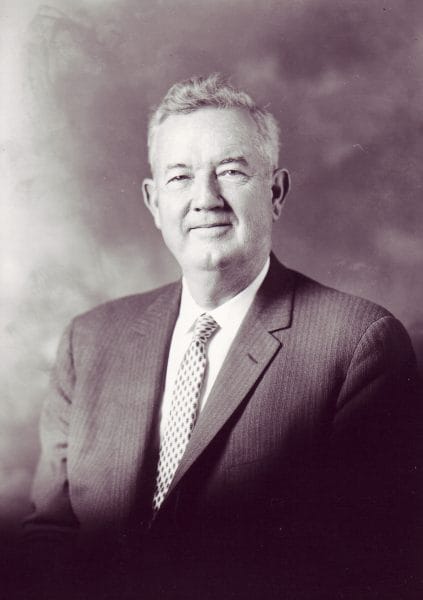 John Sparkman
John Sparkman (1899-1985) represented Alabama for 42 years in the U. S. Congress, first in the House of Representatives (1937-46), and then in the Senate (1946-79). He became known as one of the nation’s most skilled legislators and in 1952 won the Democratic nomination for vice-president. Although he consistently opposed civil rights legislation, Sparkman was viewed as a liberal during his years in the House and his first three Senate terms because of his strong support for unions, public housing, aid to education, hospital and health-care funding, increased public-works spending, higher minimum wages, veterans programs, and small businesses.
John Sparkman
John Sparkman (1899-1985) represented Alabama for 42 years in the U. S. Congress, first in the House of Representatives (1937-46), and then in the Senate (1946-79). He became known as one of the nation’s most skilled legislators and in 1952 won the Democratic nomination for vice-president. Although he consistently opposed civil rights legislation, Sparkman was viewed as a liberal during his years in the House and his first three Senate terms because of his strong support for unions, public housing, aid to education, hospital and health-care funding, increased public-works spending, higher minimum wages, veterans programs, and small businesses.
Born on December 20, 1899, near the Tennessee Valley town of Hartselle in Morgan County, John Jackson Sparkman was the seventh of 11 children of Joseph Whitten and Julia Mitchell Kent Sparkman. Although Sparkman later spoke of his father as a lowly tenant farmer in an effort to win support among the rural lower classes, Joseph Whitten was also a well-known activist in local politics, serving as Morgan County deputy sheriff for many years.
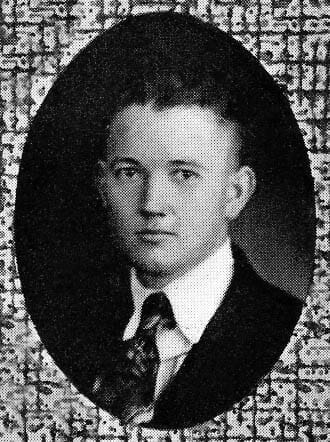 John Sparkman at the University of Alabama
In 1917, armed with a Morgan County High School diploma and money he earned from raising cotton, Sparkman entered the University of Alabama. He worked at various jobs to pay his way through school, including shoveling coal in the university’s boiler room. In October 1918, during World War I, Sparkman enlisted in the U.S. Army, but the war ended a month later, and he returned to school. He remained in the Army Reserve for many years and by 1950 had attained the rank of lieutenant colonel. He earned his bachelor’s degree and a Phi Beta Kappa key from the University of Alabama in 1921 and a law degree in 1923. Sparkman was also editor of the student newspaper, the Crimson White, and in 1922 was elected president of the Student Government Association. He met Ivo Hall of Albertville at the university, and they were married on June 2, 1923. Their only child, Julia Ann, was born a little more than a year later. The young couple stayed in Tuscaloosa another year, and Sparkman earned a master’s degree in history while working as a part-time university instructor and secretary at the local YMCA.
John Sparkman at the University of Alabama
In 1917, armed with a Morgan County High School diploma and money he earned from raising cotton, Sparkman entered the University of Alabama. He worked at various jobs to pay his way through school, including shoveling coal in the university’s boiler room. In October 1918, during World War I, Sparkman enlisted in the U.S. Army, but the war ended a month later, and he returned to school. He remained in the Army Reserve for many years and by 1950 had attained the rank of lieutenant colonel. He earned his bachelor’s degree and a Phi Beta Kappa key from the University of Alabama in 1921 and a law degree in 1923. Sparkman was also editor of the student newspaper, the Crimson White, and in 1922 was elected president of the Student Government Association. He met Ivo Hall of Albertville at the university, and they were married on June 2, 1923. Their only child, Julia Ann, was born a little more than a year later. The young couple stayed in Tuscaloosa another year, and Sparkman earned a master’s degree in history while working as a part-time university instructor and secretary at the local YMCA.
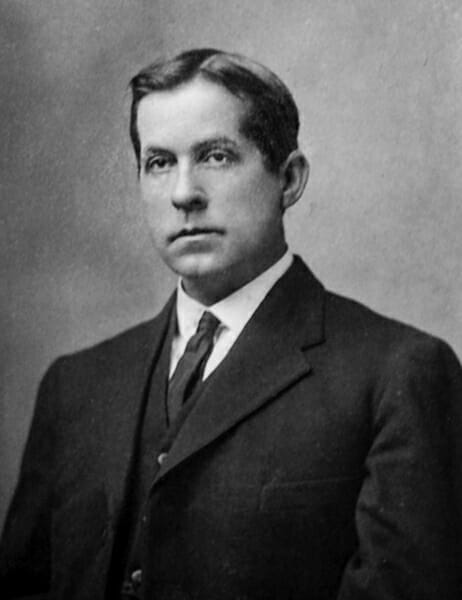 Archibald Hill Carmichael
Sparkman established a law practice in Huntsville in 1925, and the next year served as Madison County campaign manager for U.S. Senate candidate Hugo L. Black. The young attorney was appointed U.S. Commissioner for Alabama‘s northern judicial district (similar to a lower court judge today) in 1929, and a year later joined a prominent Huntsville law firm. When A. H. Carmichael, congressman from Alabama’s Eighth District, announced he would not seek re-election in 1936, Sparkman ran for the House seat. He drew four opponents in the Democratic primary, and for the only time in his career was forced into a runoff, which he won handily.
Archibald Hill Carmichael
Sparkman established a law practice in Huntsville in 1925, and the next year served as Madison County campaign manager for U.S. Senate candidate Hugo L. Black. The young attorney was appointed U.S. Commissioner for Alabama‘s northern judicial district (similar to a lower court judge today) in 1929, and a year later joined a prominent Huntsville law firm. When A. H. Carmichael, congressman from Alabama’s Eighth District, announced he would not seek re-election in 1936, Sparkman ran for the House seat. He drew four opponents in the Democratic primary, and for the only time in his career was forced into a runoff, which he won handily.
Sparkman entered the House in 1937, when many southern lawmakers were turning away from Pres. Franklin Roosevelt’s New Deal programs, but he supported nearly all of Roosevelt’s domestic and foreign policy initiatives. A staunch defender of the Tennessee Valley Authority, which constructed and managed major facilities in his district, Sparkman successfully pushed measures to strengthen the agency. As a member of the House Military Affairs Committee, Sparkman supported the president’s efforts to prepare the country for a possible war in Europe, thus gaining a reputation as an “internationalist.” He also played a leading role in getting the army to locate a military chemical plant in his hometown of Huntsville, and during World War II the government expanded the facility into Redstone Arsenal, which became Huntsville’s leading employer.
 John Sparkman and Wernher von Braun
Despite his opposition to congressional efforts to repeal the poll tax, Sparkman asserted his independence from southern legislators in 1944 by voting for the Soldier’s Vote Bill, which would have made it easier for armed services personnel overseas to register and vote in national elections. Most southerners in Congress labeled the bill as an effort to assert federal control over voting, but Sparkman believed those fighting for democracy should have easier ballot access. Although he was criticized for his vote, it did not seem to affect his Eighth District constituents, who sent him to the House again. A favorite of Democratic congressional leaders, in 1946 Sparkman was elected Democratic Whip or Assistant Majority Leader of the House.
John Sparkman and Wernher von Braun
Despite his opposition to congressional efforts to repeal the poll tax, Sparkman asserted his independence from southern legislators in 1944 by voting for the Soldier’s Vote Bill, which would have made it easier for armed services personnel overseas to register and vote in national elections. Most southerners in Congress labeled the bill as an effort to assert federal control over voting, but Sparkman believed those fighting for democracy should have easier ballot access. Although he was criticized for his vote, it did not seem to affect his Eighth District constituents, who sent him to the House again. A favorite of Democratic congressional leaders, in 1946 Sparkman was elected Democratic Whip or Assistant Majority Leader of the House.
Sparkman won renomination to the House without opposition in May 1946, but when U.S. senator John H. Bankhead Jr. died suddenly in June, Sparkman ran in the special election to fill his seat. Supported by Alabama senator Lister Hill‘s statewide organization, by other New Dealers, and by organized labor, Sparkman easily defeated Mobile congressman Frank W. Boykin and Birmingham state senator James A. Simpson in the July 30 Democratic primary. The Democratic nominee for both the House and Senate, Sparkman became the only Alabamian in history to win both offices in the same general election. In November, he resigned from the House and moved to the Senate; his seat was taken by Democrat Robert Emmett Jones Jr. Over the next 20 years, he formed an extraordinary partnership with Senator Hill, leading many observers to contend that Alabama’s two senators were the most able and effective in Congress. During their more than 20 years in the Senate together, their voting records showed few disagreements and in many congressional sessions were virtually identical.
Sparkman entered the Senate knowing that he had to face a campaign for a full term in 1948, and thus issues before the 80th Congress (1947‑48) were crucial to his future. Republicans won control of Congress in the 1946 elections and pushed legislation to restrict the power of labor unions. Alabama businessmen strongly favored such measures, putting Sparkman in a difficult position. Sparkman broke with Senator Hill and voted for the anti-union Taft-Hartley Act, angering his labor supporters, but when Truman vetoed the bill, the junior senator switched sides and voted to sustain the veto. This transparent effort to get on both sides of this controversial issue must have worked, for Sparkman was easily elected to a full term in 1948.
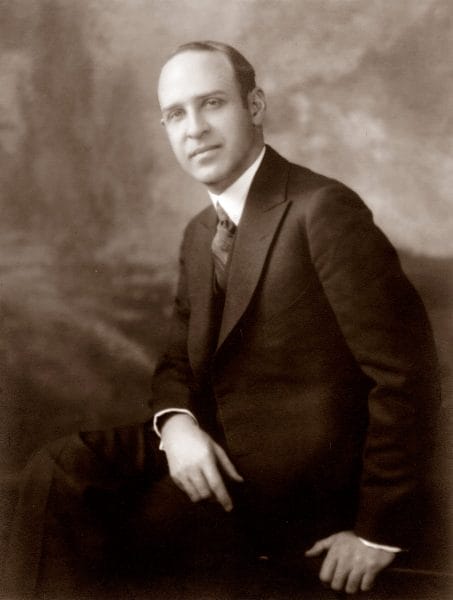 Lister Hill
The greatest threat to Sparkman’s future came when Truman supported civil rights bills to protect Black Americans from discrimination, splitting the Democratic Party into northern and southern wings. Most southerners refused to support Truman for renomination, and both Sparkman and Hill called for Democrats to choose another candidate. When Truman was nominated, angry southerners formed the “Dixiecrat Party” to oppose the president, but Sparkman and Hill demonstrated their loyalty to the Democratic Party by refusing to endorse the third‑party movement. Truman’s position on civil rights meant they could not openly support him either, and the two men essentially sat out the 1948 fall presidential campaign. In 1950, they joined forces to help oust Dixiecrats from leadership positions in the state Democratic Party.
Lister Hill
The greatest threat to Sparkman’s future came when Truman supported civil rights bills to protect Black Americans from discrimination, splitting the Democratic Party into northern and southern wings. Most southerners refused to support Truman for renomination, and both Sparkman and Hill called for Democrats to choose another candidate. When Truman was nominated, angry southerners formed the “Dixiecrat Party” to oppose the president, but Sparkman and Hill demonstrated their loyalty to the Democratic Party by refusing to endorse the third‑party movement. Truman’s position on civil rights meant they could not openly support him either, and the two men essentially sat out the 1948 fall presidential campaign. In 1950, they joined forces to help oust Dixiecrats from leadership positions in the state Democratic Party.
Sparkman won appointment to two prestigious Senate committees, Banking and Currency and Foreign Relations, and in 1949 was named chairman of Banking and Currency’s subcommittee on housing. That same year, he won national attention for initiating and then guiding through the Senate a major new housing law that made it easier for middle-class Americans to buy a home. He championed public housing in the 1950s and, over objections of the real estate industry, steered several measures through the Senate to help low-income families gain an adequate place to live. Sparkman became the Senate’s expert on housing, but he also helped to create and was named the first chairman of the Senate’s Select Committee on Small Business, which conducted studies of the U.S. economy and recommended government action. Sparkman shrewdly used his growing clout in Congress to help both the poor and needy and the business interests that could help him. Financial, building, and other business groups recognized his power and began to funnel sizeable contributions to his political campaigns. The federal programs he supported proved lucrative to these interest groups.
After World War II, the federal government brought a number of German experts in rocketry, including Wernher von Braun, to the United States, and Sparkman was instrumental in locating them at Huntsville’s Redstone military arsenal. Soon, the sleepy southern mill town became home to the nation’s most advanced rocket program and eventually home to the Marshall Space Flight and Rocket Center. Thanks largely to Sparkman’s efforts, Huntsville was the fastest-growing city in Alabama in the 1950s, and soon became the third largest in the state.
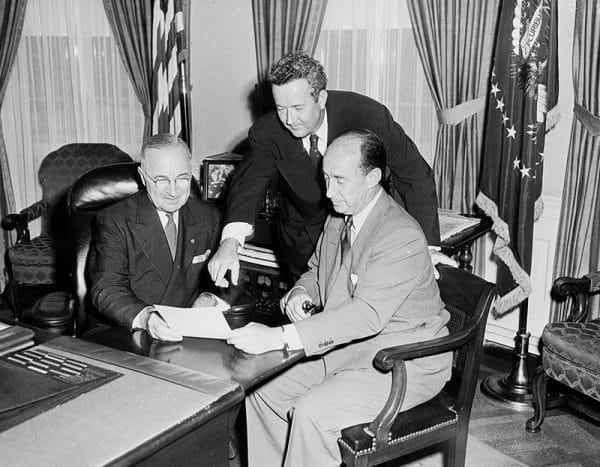 Sparkman, Stevenson, and Truman
In 1952, Sparkman supported Georgia senator Richard Russell for president and served as his floor manager at the Democratic National Convention. When the delegates nominated Illinois governor Adlai Stevenson instead, President Truman and a small group of political insiders suggested Sparkman for the vice-presidential nomination. The Democratic Convention ratified this choice, but important civil rights groups opposed the nomination, and it became controversial. During the campaign, Sparkman refused to say that he would support civil rights legislation, but in private interviews he suggested as much, telling one Black editor that if were elected vice-president he would become “another Hugo Black,” a reference to the Alabama-born Supreme Court justice who championed civil rights. Despite a vigorous campaign, Stevenson and Sparkman were badly defeated by the Republican ticket of Dwight D. Eisenhower and Richard Nixon.
Sparkman, Stevenson, and Truman
In 1952, Sparkman supported Georgia senator Richard Russell for president and served as his floor manager at the Democratic National Convention. When the delegates nominated Illinois governor Adlai Stevenson instead, President Truman and a small group of political insiders suggested Sparkman for the vice-presidential nomination. The Democratic Convention ratified this choice, but important civil rights groups opposed the nomination, and it became controversial. During the campaign, Sparkman refused to say that he would support civil rights legislation, but in private interviews he suggested as much, telling one Black editor that if were elected vice-president he would become “another Hugo Black,” a reference to the Alabama-born Supreme Court justice who championed civil rights. Despite a vigorous campaign, Stevenson and Sparkman were badly defeated by the Republican ticket of Dwight D. Eisenhower and Richard Nixon.
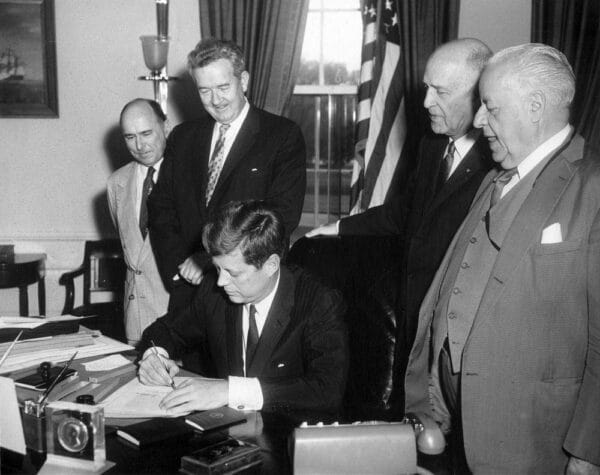 Mobile’s 250th Anniversary Commemoration
Sparkman was also an active member of the Senate Foreign Relations Committee, and Truman named him a delegate to the United Nations. When Wisconsin’s Republican senator Joseph McCarthy accused several of Truman’s state department appointees of having Communist connections, Sparkman confronted McCarthy and demanded evidence to support the charges. In 1954, the Alabamian joined other senators in voting to censure McCarthy. Despite this, Sparkman was a strong supporter of containing the power of the Soviet Union and China. He believed the world was clearly divided between the forces of totalitarian Communism and the forces of capitalism and democracy, but he favored peaceful coexistence and careful negotiations over the inflammatory rhetoric of Eisenhower’s secretary of state John Foster Dulles. Under the John F. Kennedy administration, Sparkman helped speed the 1963 Nuclear Test Ban Treaty through the Senate and flew with the president to Paris for the signing of the document. Sparkman was sent on numerous diplomatic missions as a member of joint congressional committees, and his wife Ivo published a book entitled Over the Senator’s Shoulder, in which she described their many travels abroad.
Mobile’s 250th Anniversary Commemoration
Sparkman was also an active member of the Senate Foreign Relations Committee, and Truman named him a delegate to the United Nations. When Wisconsin’s Republican senator Joseph McCarthy accused several of Truman’s state department appointees of having Communist connections, Sparkman confronted McCarthy and demanded evidence to support the charges. In 1954, the Alabamian joined other senators in voting to censure McCarthy. Despite this, Sparkman was a strong supporter of containing the power of the Soviet Union and China. He believed the world was clearly divided between the forces of totalitarian Communism and the forces of capitalism and democracy, but he favored peaceful coexistence and careful negotiations over the inflammatory rhetoric of Eisenhower’s secretary of state John Foster Dulles. Under the John F. Kennedy administration, Sparkman helped speed the 1963 Nuclear Test Ban Treaty through the Senate and flew with the president to Paris for the signing of the document. Sparkman was sent on numerous diplomatic missions as a member of joint congressional committees, and his wife Ivo published a book entitled Over the Senator’s Shoulder, in which she described their many travels abroad.
In his first 15 years in the Senate, Sparkman voted more frequently with northern liberals than with conservative southerners. The Alabamian supported New Deal policies that gave the federal government increased power to help the poverty-stricken South. He and Senator Hill collaborated to pour hundreds of millions of federal dollars into Alabama, but when the civil rights movement swept through the South in the late 1950s and 1960s, a backlash against big-government liberalism opened the senators to criticism. Despite their vigorous participation in filibusters against civil rights legislation, Hill and Sparkman were accused by their enemies of working with northern liberals like President Kennedy to increase the power of the national government over the states. Both Sparkman and Hill were among the southern Democrats who signed the “Southern Manifesto” opposing school integration. They also opposed the Civil Rights Acts of 1957, 1960, and 1964, all of which aimed to strengthen voting rights, the 1965 Voting Rights Act, and the 1968 Civil Rights Act. It was that powerful central government, charged Alabama governor George Wallace, that was behind the civil-rights forces. Sparkman received a shock in 1962 when right-wing Republican James Martin of Gadsden, running a campaign almost exclusively against the growing power of the federal government, came within 6,000 votes of defeating Hill. It was the first serious challenge by a Republican to a statewide Democratic Party officeholder in the twentieth century.
Heeding the message sent by voters in 1962 and intimidated by the rise of white supremacist governor George Wallace in Alabama politics, Alabama’s senators moved sharply to the right, voting more and more with a conservative congressional coalition of southern Democrats and Republicans. Despite Sparkman’s growing conservatism, Republicans tried mightily to defeat him in 1966 and again in 1972, but he won each election by a landslide vote. In 1967, Sparkman became chairman of the Committee on Banking and Currency, but in 1975 he gave up that position in order to head the more prestigious Committee on Foreign Relations. Unfortunately, age had reduced the skill and acuity of the once vital senator, and he was criticized for poor leadership of the committee. Sparkman announced he would not seek re-election in 1978 and retired from politics the next year. He spent his last years in Huntsville, and died there on November 16, 1985.
Further Reading
- Hamilton, Virginia Van der Veer. Lister Hill: Statesman from the South. Chapel Hill: University of North Carolina Press, 1987.
- McPherson, Harry. A Political Education. Boston: Little, Brown, 1972.
- Sparkman, Ivo Hall. Over the Senator’s Shoulder: A Glance at the East. Huntsville, Ala.: Strode Publishers, 1966.
- ———. Journeys with the Senator. Huntsville, Ala.: Strode Publishers, 1977.
